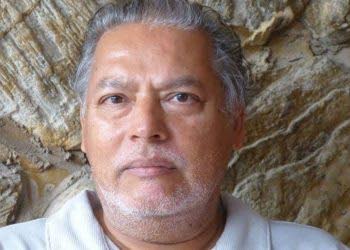A tribute to Kamal Persad

DR VISHNU BISRAM
TT HAS lost an irreplaceable figure with the passing of Kamal Persad, educator and public commentator, who died last week. I had the pleasure and honour to meet Kamal in Trinidad on countless occasions from 1981 and until recently. There are many fond memories of correspondences and of meeting and engaging him, and of his published writings and activism.
He was warm, kind, wise, bright, clever, smart, brilliant, tenacious and resourceful. Not many are aware of his contributions to TT because he was removed from mainstream media two decades ago and, unfortunately, fell ill a decade ago. His writings became sparse over the last several years, but he remained steadfast in his principle of equality.
I first learned of Kamal Persad from his writings and socio-cultural and political activism while he was a student at UWI during the 1970s, and subsequently as a teacher while I was a student at City College of City University in New York, and subsequently as an educator as well.
This led to the exchange of correspondences with him, Samaroo Siewah, Kumar Mahabir, Ashram Maharaj, Ramdath Jagessar, Rajnie Ramlakhan and other youthful activists and writers. We shared community newsletters and other publications for well over two decades.
A trip to Trinidad in the summer of 1981 allowed me an opportunity to engage Kamal and several other activists, and a pressure group was formed to support a New York-pioneered movement championing free and fair elections in Guyana. The Trinidad group included Kamal, Siewah, Kumar, Ashram, Rajnie, Roodal Moonilal, John Jaglal, Mukesh Baburam and Jagessar.
Devant Maharaj and Doolarchand Hanoman would in later years support the movement for free and fair elections in Guyana during the tenure of the Forbes Burnham dictatorship. They all played some kind of role in the struggle for restoration of democracy (1992) in Guyana, although they were never recognised for their contributions by the (selfish) beneficiaries in Guyana.
Besides teaching for some 30 years, Kamal was a distinguished community activist and among the best researchers (on Indian issues) and commentators (columnists I read) in the Express and in other newspapers with his letters. He also published his own magazines, newsletters and booklets.
His first love was reading and writing and his focus was on Indian issues. He was addicted to reading newspapers and maintained a collection of clippings for many years for future writings.
He made a remarkable contribution on contemporary social history of Indo-Trinidadians, although he also wrote booklets and columns on Indians in the Caribbean exposing racism and electoral fraud in Guyana.
His voluminous writings were a sign of extraordinary intellect. Also, he had a presence at every seminar, lecture and conference on Indians. He admired and respected academics like John La Guerre, Kusha Harracksingh, Kelvin Singh, Brinsley Samaroo and others who taught him at UWI.
He was also a great admirer of Trevor Sudama and Kelvin Ramnath for their parliamentary contributions, and Ramesh Lawrence Maharaj for his legal brilliance. He praised Sudama for his writings exposing racial inequities.
Kamal also played a role in the campaign to get the UNC elected and of Basdeo Panday becoming prime minister. He was there in the rain at the Aranguez Savannah when the party was launched and was among the earliest to become a member. He was in court when Panday was charged.
But Kamal was not shy of critiquing errors of the UNC administration. He was disappointed with the corruption that beset the administration, as he also was during the Kamla Persad-Bissessar government.
Kamal was widely known for his research, writing and supporting publications on Indians, often providing finance for these when funding was scarce. He roamed through libraries on early Indo-Trinidadian history and did some research on previously unknown Indian pioneers in various fields, not the least being in journalism.
He subscribed to the idea of an unwavering commitment to truth, honesty and compassion. More than a writer, he was a consummate advocate for fairness and equality for Indians. He courageously and fearlessly exposed societal and governmental misconduct and racism.
He was one of best columnists of his time, often taking on Selwyn Ryan and other commentators, and it was always a great pleasure to read his writings. He wrote with incredible candidness, supported by facts and great research. Hardly any fault or inaccuracies could be found in his writings.
Another of his finest human qualities was his unassuming nature. Although a deep thinker, an intellectual, he was simple and down-to-earth as uncovered in multiple trips by Siewah and myself to his home.
Kamal, like a few other activists like Rajnie, Ashram, Kumar, Siewah and others, assisted with polling for NACTA (North American Caribbean Teachers Association), volunteering time to interview many respondents in dozens of polls from 1995 onwards. He was always praiseworthy of NACTA polling. Kamal collated data for NACTA and based on findings also suggested ideas for commentaries in press releases.
I am disappointed that Kamal was never honoured for his contributions to the Indian community and to the UNC. But such is life. Those who sweat under the sun rarely get credit for the work, while others who are sheltered reap the benefits.
It is hoped that this tribute will galvanise people to turn to the writings of Kamal and that young scholars will be encouraged to undertake research on the Indian community in Trinidad and the region. He started a serious investigation into critical issues affecting Indo-Trinis that has been picked up by other commentators. A great amount of work on the community still needs to be done.

Comments
"A tribute to Kamal Persad"